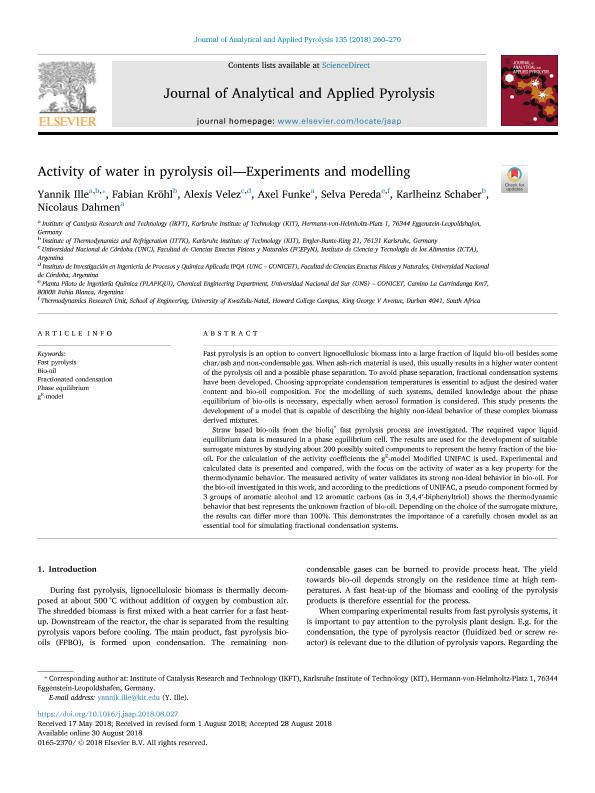Mostrar el registro sencillo del ítem
dc.contributor.author
Ille, Yannik
dc.contributor.author
Kröhl, Fabian
dc.contributor.author
Velez, Alexis

dc.contributor.author
Funke, Axel
dc.contributor.author
Pereda, Selva

dc.contributor.author
Schaber, Karlheinz
dc.contributor.author
Dahmen, Nicolaus
dc.date.available
2019-11-28T16:16:18Z
dc.date.issued
2018-10
dc.identifier.citation
Ille, Yannik; Kröhl, Fabian; Velez, Alexis; Funke, Axel; Pereda, Selva; et al.; Activity of water in pyrolysis oil—Experiments and modelling; Elsevier Science; Journal of Analytical and Applied Pyrolysis; 135; 10-2018; 260-270
dc.identifier.issn
0165-2370
dc.identifier.uri
http://hdl.handle.net/11336/90778
dc.description.abstract
Fast pyrolysis is an option to convert lignocellulosic biomass into a large fraction of liquid bio-oil besides some char/ash and non-condensable gas. When ash-rich material is used, this usually results in a higher water content of the pyrolysis oil and a possible phase separation. To avoid phase separation, fractional condensation systems have been developed. Choosing appropriate condensation temperatures is essential to adjust the desired water content and bio-oil composition. For the modelling of such systems, detailed knowledge about the phase equilibrium of bio-oils is necessary, especially when aerosol formation is considered. This study presents the development of a model that is capable of describing the highly non-ideal behavior of these complex biomass derived mixtures. Straw based bio-oils from the bioliq® fast pyrolysis process are investigated. The required vapor liquid equilibrium data is measured in a phase equilibrium cell. The results are used for the development of suitable surrogate mixtures by studying about 200 possibly suited components to represent the heavy fraction of the bio-oil. For the calculation of the activity coefficients the gE-model Modified UNIFAC is used. Experimental and calculated data is presented and compared, with the focus on the activity of water as a key property for the thermodynamic behavior. The measured activity of water validates its strong non-ideal behavior in bio-oil. For the bio-oil investigated in this work, and according to the predictions of UNIFAC, a pseudo component formed by 3 groups of aromatic alcohol and 12 aromatic carbons (as in 3,4,4′-biphenyltriol) shows the thermodynamic behavior that best represents the unknown fraction of bio-oil. Depending on the choice of the surrogate mixture, the results can differ more than 100%. This demonstrates the importance of a carefully chosen model as an essential tool for simulating fractional condensation systems.
dc.format
application/pdf
dc.language.iso
eng
dc.publisher
Elsevier Science

dc.rights
info:eu-repo/semantics/openAccess
dc.rights.uri
https://creativecommons.org/licenses/by-nc-sa/2.5/ar/
dc.subject
BIO-OIL
dc.subject
FAST PYROLYSIS
dc.subject
FRACTIONATED CONDENSATION
dc.subject
GE-MODEL
dc.subject
PHASE EQUILIBRIUM
dc.subject.classification
Ingeniería Química

dc.subject.classification
Ingeniería Química

dc.subject.classification
INGENIERÍAS Y TECNOLOGÍAS

dc.title
Activity of water in pyrolysis oil—Experiments and modelling
dc.type
info:eu-repo/semantics/article
dc.type
info:ar-repo/semantics/artículo
dc.type
info:eu-repo/semantics/publishedVersion
dc.date.updated
2019-10-24T19:36:49Z
dc.journal.volume
135
dc.journal.pagination
260-270
dc.journal.pais
Países Bajos

dc.journal.ciudad
Amsterdam
dc.description.fil
Fil: Ille, Yannik. Karlsruhe Institute of Technology. Institute of Catalysis Research and Technology; Alemania. Karlsruhe Institute of Technology. Institute of Thermodynamics and Refrigeration; Alemania
dc.description.fil
Fil: Kröhl, Fabian. Karlsruhe Institute of Technology. Institute of Thermodynamics and Refrigeration; Alemania
dc.description.fil
Fil: Velez, Alexis. Universidad Nacional de Córdoba. Instituto de Investigación y Desarrollo en Ingeniería de Procesos y Química Aplicada. Consejo Nacional de Investigaciones Científicas y Técnicas. Centro Científico Tecnológico Conicet - Córdoba. Instituto de Investigación y Desarrollo en Ingeniería de Procesos y Química Aplicada; Argentina
dc.description.fil
Fil: Funke, Axel. Karlsruhe Institute of Technology. Institute of Catalysis Research and Technology; Alemania
dc.description.fil
Fil: Pereda, Selva. Consejo Nacional de Investigaciones Científicas y Técnicas. Centro Científico Tecnológico Conicet - Bahía Blanca. Planta Piloto de Ingeniería Química. Universidad Nacional del Sur. Planta Piloto de Ingeniería Química; Argentina. University of KwaZulu-Natal; Sudáfrica
dc.description.fil
Fil: Schaber, Karlheinz. Karlsruhe Institute of Technology. Institute of Thermodynamics and Refrigeration; Alemania
dc.description.fil
Fil: Dahmen, Nicolaus. Karlsruhe Institute of Technology. Institute of Catalysis Research and Technology; Alemania
dc.journal.title
Journal of Analytical and Applied Pyrolysis

dc.relation.alternativeid
info:eu-repo/semantics/altIdentifier/url/https://www.sciencedirect.com/science/article/pii/S0165237018304455?via%3Dihub
dc.relation.alternativeid
info:eu-repo/semantics/altIdentifier/doi/http://dx.doi.org/10.1016/j.jaap.2018.08.027
Archivos asociados
